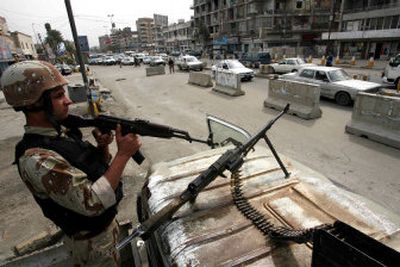No plans ‘right now’ to boost Iraq troops

BAGHDAD, Iraq – Gen. David Petraeus, the top U.S. commander in Iraq, said Thursday he would examine “some months” from now whether to seek an extension of the administration’s troop increase and that he had no plans “right now” to request additional forces.
“If you’re going to achieve the kinds of effects that we probably need,” Petraeus said during his first news conference since taking command a month ago, the increased troop level “would need to be sustained certainly for some time well beyond the summer.”
That comment represented a shift from his predecessor’s assessment of when results would be visible. Gen. George W. Casey Jr., said in January that “it’s probably going to be the summer, late summer, before we get to the point where the people in Baghdad feel safe in their neighborhoods.”
Petraeus requested the additional troops to implement a counter-insurgency strategy that calls for deploying forces in small bases and outposts among civilians in order to protect them from militants.
By raising the possibility of extending the increase, Petraeus is addressing a key concern of U.S. military officials that Iraqi insurgents and militias will simply wait out the Baghdad security plan being implemented by U.S. and Iraqi forces.
In recent weeks there have been indications that militias, especially anti-American Shiite cleric Muqtada al-Sadr’s Mahdi Army, are lying low while the U.S. military boosts its troop levels in Baghdad. One perceived advantage that militias and insurgents have over the U.S. military is that they are operating on a longer time span, and have more patience, than the Americans.
Yet if Petraeus does recommend later this year to keep troop numbers at a higher level into the winter and perhaps beyond, and the Bush administration accepts that proposal, providing the extra soldiers would place new strains on the Army and Marine Corps. Troops would have to be sent back to Iraq sooner than planned, perhaps with their training curtailed.
Petraeus also said 2,200 new military police will be arriving in Baghdad in a few months to support the 21,500 additional troops being deployed to secure Baghdad and other volatile areas of Iraq.
He did not confirm a report in Thursday’s New York Times saying that his second-in-command, Lt. Gen. Raymond Odierno, has recommended that the additional U.S. troops stay in Iraq through February 2008.
Petraeus also said Thursday that military efforts need to be coupled with political reforms, including the absorption of what he termed “reconcilable” outlaw groups into society.
U.S. and Iraqi officials are “trying to determine over time who are the irreconcilables and who are the reconcilables,” Petraeus said.
Petraeus, who left Iraq nearly a year and a half ago at the close of a previous tour, said he was struck by the bad shape of some neighborhoods in the capital.
“I must tell you that I was taken aback by what I saw in driving around,” he said, listing several sectors of the city that were once heavily populated by Sunnis or that were home to people of both sects. “When I left 17 months ago now, there certainly was not the kind of emptiness in some of the neighborhoods of Baghdad.”